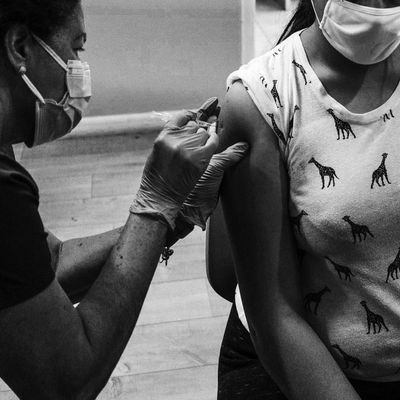
It’s been over a year since the first person in the U.S. received the COVID-19 vaccine. Though roughly 62 percent of Americans are now fully vaccinated, health officials are still expecting a repeat of 2020’s massive end-of-year spike in infections, especially now that the Omicron variant has entered the picture. With that in mind, experts (including Dr. Anthony Fauci) have said booster shots will be an essential tool to help keep infections under control in the New Year. Since the booster’s initial rollout in September 2021, the CDC has expanded its recommendations on who should get the booster shot and when. Here’s what we know.
Do I need a booster shot?
The CDC is recommending booster shots for all adults. Anyone over 18 who got the one-shot Johnson & Johnson vaccine should get a booster two months after the first shot, and anyone over the age of 18 who got Moderna or Pfizer-BioNTech should get a booster five months past their initial immunization. As of January 3, the FDA has approved Pfizer booster shots for adolescents 12 to 17 years old. Like the COVID vaccine, boosters were first recommended for the most vulnerable groups: adults over 65, long-term-care residents over 18, and people over 50 with underlying medical conditions. Younger adults with underlying conditions and those who work in high-risk environments had also been previously eligible per the CDC.
Can I mix and match vaccines?
According to the FDA, yes. In October, the administration approved a plan that lets adults pick whether they want their booster to be Pfizer, Moderna, or Johnson & Johnson no matter what their original shot was. The plan is mainly to help make boosters more accessible — if your closest vaccine provider is only offering one type, you won’t have to go looking for one that matches your first dose — but some studies have found mixing vaccines creates a stronger immune response than multiple doses of the same vaccine.
Will the booster shots have any side effects?
So far, it seems the side effects from the booster shots are about the same as what people felt after first doses — mainly fatigue and soreness at the injection site.
Are boosters really going to help?
Fauci has been pushing for all adults to get booster shots throughout the past month, citing studies that have shown they dramatically increase individuals’ protection against hospitalization and death. There’s substantial evidence immunity diminishes in vaccine recipients of all ages, and though the vaccines initially seemed to be waning in infection prevention but holding up in preventing hospitalization and death, small upticks in hospitalizations of fully vaccinated coronavirus patients suggest boosters will be necessary not just to prevent infection but also to ensure breakthrough cases remain mild. CDC director Rochelle Walensky also cited concern about the Omicron variant, and initial data from Pfizer-BioNTech seems to indicate that their booster offers significant protection against Omicron. It’s still not clear how the new strain will hold up against other vaccines.
Some experts have their doubts that distributing boosters will do much to fortify our collective protection against COVID. One FDA regulator said that while boosters will help individuals keep themselves protected, the “greatest impact on a population level is still dependent on increasing vaccine uptake” (i.e., getting first shots in people’s arms). It’s proving more and more difficult to get Americans lined up for more shots: As of December, only about 30 percent of fully vaccinated adults had received the booster despite eligibility. The main demographic seeking them out seems to be fully vaccinated white people with higher socioeconomic status and better access to medical care — the group least vulnerable to exposure, severe disease, hospitalization, and death. It seems the population mainly responsible for driving the spread of COVID is the roughly 40 percent of Americans who are still unvaccinated.
Will we need booster shots forever?
No one knows! It’s possible the COVID vaccine could become like a flu shot, administered once or even twice a year — and it could be different each time depending on which variant health experts expect to see.
This post has been updated.





